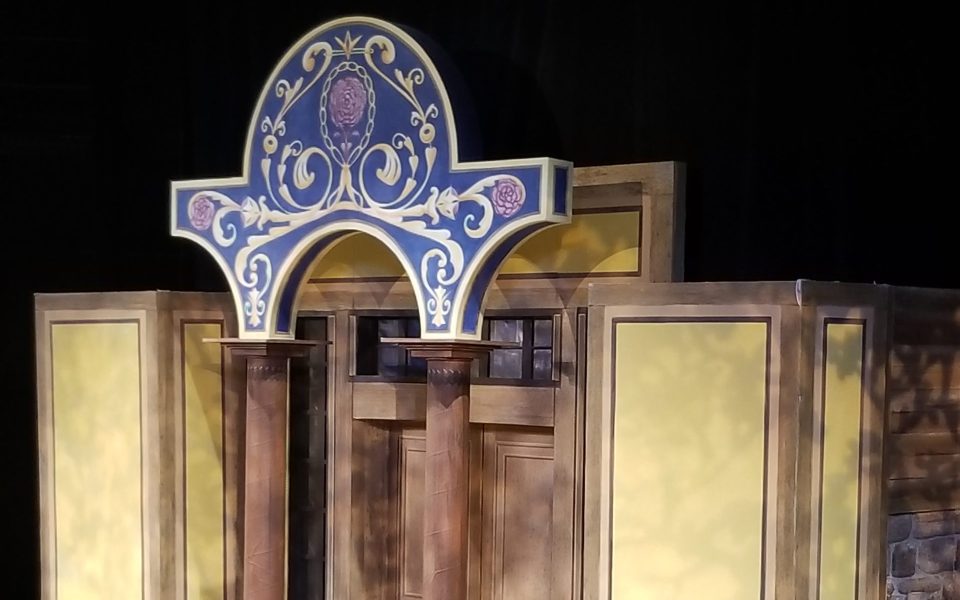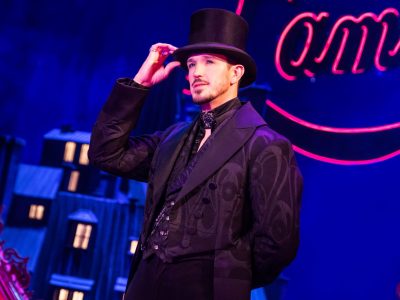Making the choice of what production to perform on stage can often be a laborious and frustrating decision. Yet, given the state of the world, the choice to perform George Bernard Shaw’s Arms and the Man seems fitting, though perhaps a little ambitious.
Some writers and artists can be enigmatic when it comes to their personal ideals and morals, but from the very first moments of Shaw’s Arms and the Man, the curtain is literally lifted, and we are given sight into Shaw’s beautiful and often strongly opinionated mind. And while many directors and actors shy away from Shaw as the language and subtleties of his works prove more difficult than necessary, the UNC School of the Arts drama students seemed truly a part of Shaw’s universe.
In the spring semester, the School of Drama students studied Shaw and his techniques in a 10-week course, taught by visiting faculty director Kent Stephens, who also directed the play.
“This production was really building on that pedagogy,” Stephens said. “And so in choosing which play to perform, we felt that Arms and the Man would be the best fit for the performers and for our audience.”
Having directed the play 25 years earlier in San Jose, Calif., Stephens’ approach to the performance at the School of the Arts stuck closely to Shaw’s script.
“I’ve added a few little tricks of my own,” Stephens said. “But Shaw’s universe is pretty resistant to high concept. He is a complete artist and he gives you a completely imagined world, and some people have been effective at stripping him down, but I don’t believe anyone has ever been successful at putting a concept on top of him. He’s always going to be smarter than the director.”
The play’s final run, beginning on Nov. 2, was sold out weeks in advance after high praise of the show’s initial performances the weekend before, and the audience was not let down. The stage was brilliantly imagined with even the smallest details examined; from sound effects and lighting, the stage was brought to life and suspension of disbelief was made easy by the quality of the cast.
Set in 1885 during the Serbo-Bulgarian War, the play features a small cast and minimal set changes. Not shying from the difficulties of Shaw’s writing, every one of the actors moved and spoke like professionals. As the houselights slowly brightened and traditional Bulgarian music bellowed through the loud speakers, leading woman Rania Petkoff, played by Hannah Myers, led the crowd perfectly and effortlessly into 19th century Europe. Though no accents were used, the mood of the theater and stage, made extremely believable by the intricately painted and designed sets, was instantly transported into that strange world of fiction, of suspended disbelief.
Arms and the Man takes up the difficult task of making a hilarious joke of the futility of war and love. These themes run through the play, stretching beyond its setting and have poignant insights into modern society, yet it remains in the background of the dialogue. This was perhaps the weakest part of the production.
While Shaw’s language and the innuendos that litter the lines are subtle, they require a confident and eloquent delivery. At a few key moments in the play’s opening and again in the last act, there were moments of the actors stumbling over lines or finding themselves in an awkward place on stage. However, each slip was corrected with professional grace. All eight actors showed professional talents of fully and beautifully realized comic performances. Adorned in vibrant and eye-catching costumes designed by graduate student Kristen Vanhessche, the exchange between the actors was utterly natural and organic, providing a firm foundation upon which they delivered each line of the play.
While each of the actors gave a stunning performance, Hassiem Muhammad’s character of Major Sergius Saranoff stood apart. The comedy with which he brought the hilarious macho soldier to the stage seemed effortless. Each line felt fully realized and believed not only by the actor but by his colleagues, making for a splendid and truly remarkable experience.
While many of Shaw’s contemporaries were writing about the beauty and necessity of war, Shaw’s work argued that war is not romantic and should not be praised or glorified, like that of the Greek epics, from which Shaw took the title of the play, and even Shakespeare. Rather Shaw felt that it is useless, an infinite spiral of cowardice and idiocy.
[pullquote]See UNC School of the Arts’ entire production schedule at uncsa.edu[/pullquote]
However, what made Arms such an achievement for Shaw was, as George Orwell once commented, “It is probably the wittiest play he ever wrote, the most flawless technically, and in spite of being a very light comedy, the most telling.”
It is this dramatically intricate writing and directing that transforms Arms and the Man from what might otherwise be a sloppy diatribe of one man’s politics into an important achievement of art, something that UNC School of the Drama captured with grace and elegance on the stage.
Join the First Amendment Society, a membership that goes directly to funding TCB‘s newsroom.
We believe that reporting can save the world.
The TCB First Amendment Society recognizes the vital role of a free, unfettered press with a bundling of local experiences designed to build community, and unique engagements with our newsroom that will help you understand, and shape, local journalism’s critical role in uplifting the people in our cities.
All revenue goes directly into the newsroom as reporters’ salaries and freelance commissions.





Leave a Reply